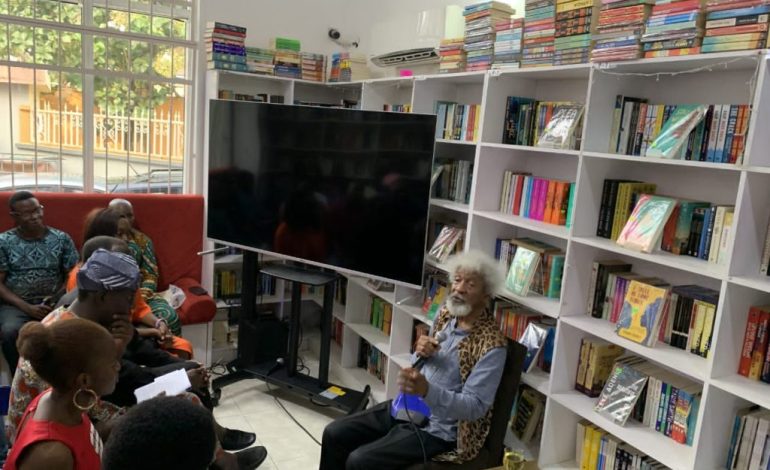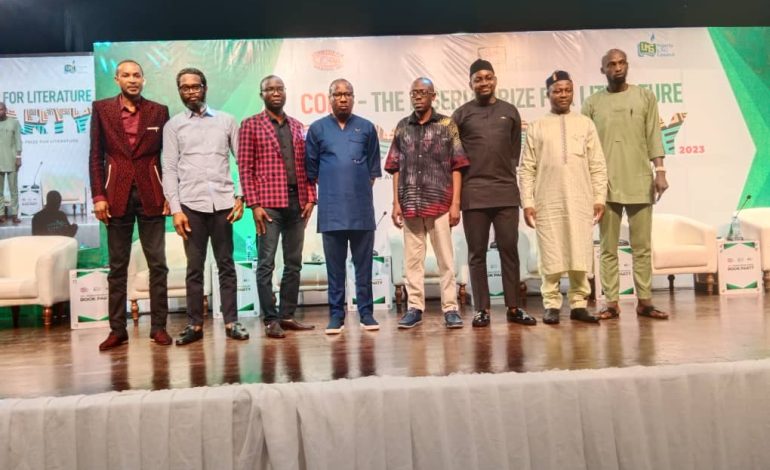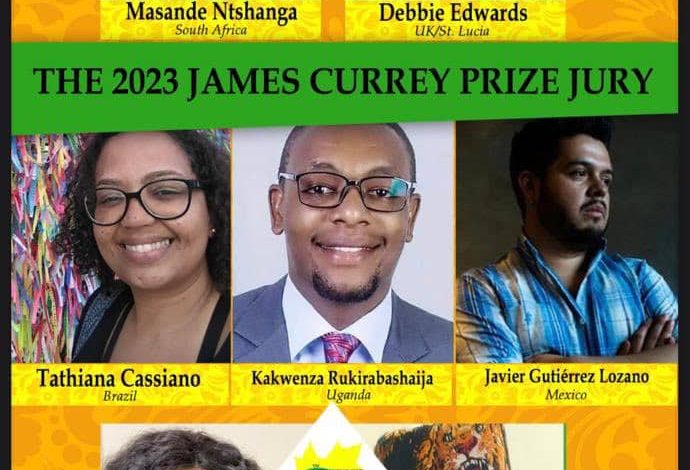Soyinka, Ajibade, humanist community condemn Bala’s imprisonment, religious intolerance

Power, dominancce, false sense of piety fuel religious intolerance, says Soyinka
‘True believers in Allah don’t prosecute for blasphemy, apostasy’
Bala begs President Tinubu to free him
By Anote Ajeluorou
IT was the writer, publisher, Ake Festival director and convener of the launch of Bubarak Bala’s pamphlet, A Prison Letter to a President, Lola Shoneyin, who provided the context for the event and Bala’s 24 years’ imprisonment by highlighting the conscious efforts being put in place for humanists to find a point of convergence in a space of their own to air their views without censorship or feeling of guilt. Clearly, religion has continued to wreak a lot of havoc and circumscribe the rights of many in the Nigerian society, especially the northern part of the country where religion is near compulsion. Bala is currently a victim of such religious compulsion where opting out of Islam has become a crime that will keep him in prison for a further 20 years instead of two that the law stipulates. The event also had Prof. Wole Soyinka who wrote the forward to the pamphlet, including his poem ‘An Anthem to Humanity’ that foresees the dangers of religious extremism, the sort for which Bala is unjustly imprisoned.
Event and Communication Manager at Ouida Books, Lagos, Omotoke Solarin-Sodara, read an excerpt from Bala’s A Prison Letter to a President. Then followed a BBC documentary of humanists in Nigeria struggling to find a footing and Bala’s arrest and journey to prison was shown. Thereafter, journalist and publisher of TheNews, Mr. Kunle Ajibade, spoke in strong condemnation of the compulsion that seems to define Nigeria’s brand of Islam, noting that it runs counter to the tenets established by the Koran that Muslims claim they got their misplaced doctrine. Ajibade said he spent considerable time in Ibadan to study Arabic and the Koran, so he could get a grasp of the Muslim holy book, but that he found nowhere that recommends compulsory conversion of anyone to its fold. To show his dexterity, Ajibade sang and read two important verses where the Koran expressly forbids compulsory conversion of non-believers. Ajibade commended the humanist spirit rising in society and wished for its ascension.
According to Ajibade, “I am happy that the context has been given. Because the humanist society is not new at all. It dates back to many, many years. And to persecute people who claim that they are members of the humanist society here shows the level of degradation in our society. What is the creed of the humanist society in the UK, for example? Basically it just says ‘love other human beings. I would take care of myself and then also look out for other human beings.’ What is wrong with that kind of creed? What does the Abrahamic religions hold dear other than look out for other human beings, particularly the vulnerable?: Be compassionate. So it is good that we are given this context, the context of the humanist tradition, which is familiar, not just with the rest of the world, except here, unfortunately.

Prof. Wole Soyinka (right) addressing humanist community in solidarity with Mubarak Bala
“The other thing I would like to say before I read an extract from the letter is to say that I don’t know what the Holy Koran these characters are reading. And that’s why I have come here with a copy of my Koran:
“There should be no compulsion in religion.
“And chapter 10, verse 99 of the Koran also, in fact, calls on Muslims to respect the free will of those other faiths and even those who don’t believe in your religion. Muslims are told in Chapter 10 Vs 99 of the Koran to respect other faiths, and those who don’t believe in your faith, those who are against your faith. Those who are familiar with the history of Islam would know that Muhammed had to be that diplomatic in other to get all these other people into the fold. There is a whole of stuff in the Satanic Verses by Salman Rushdie on that. It is true. Not much of fiction, that aspect of the satanic verses.
“Muslims are also commanded, not just told, in Chapter 3 Vs 159 of the Koran, not to be hard-hearted against non-Muslims. Chapter 3, verse 159 commanded them not to be severe and hard-hearted against non-Muslims. So where is all these nonsense coming from except that the Koran is being literarily and stupidly misinterpreted, and that it is also being manipulated to serve a purpose that is inimical to humanity. And we must all stand against that. We must stand against it, call out those people who are that, which is why I was talking about that will, the will to say no. It defines our humanity.”
Soyinka also weighed in on the vexious religious extremism matter, which has become a personal affront to his humanistic tendencies. Recall that the Nobel laureate has been having a running battle with the Emir of Ilorin, Ibrahim Sulu-Gambari over the latter’s banning of Isese Festival in the Kwara State capital on account of it not being a Muslim festival. Soyinka continued on that vein and called for serious dialogue across segments of society with a view to nipping the incipient religious intolerance in the bud.
“I welcome everyone on behalf of humanity, not just on behalf of Mubarak Bala,” Soyinka said. “It is an intimate gathering. But it is one which we hope would spread into a nationwide movement for the protection of the innocent, of the vulnerable, of those who have ben denied justice.”
Like many, Soyinka expressed shock that Bala was still languishing in prison, noting that he’d forgotten about it after the initial furore about his arrest some years ago.
According to him, “I must confess to you that I was in complete ignorance, until a few weeks ago, of the fact that Mubarak was still in prison. When he was first arrested, of course, we all made the usual noise, allied with both internal movements for human rights and external movements. I believe a letter of mine was published in many fora. And somewhere along the way, I got the impression that he had been freed. So all these months, years, I was living under total delusion. And even many of us in this country do that all the time. We do not know how many thousands or hundreds of thousands of innocent people are languishing in jails at this moment for no crime at all but simply as victims of power play.
“I can narrate to you, for instance, when I was in Kaduna. Gani Fawehimi became a tenant of the same hotel for quite a few weeks. You won’t believe what his crime was.. His crime was he defended, he took the case of the wife of a military officer as a lawyer in his professional capacity. He took the case of that lady which angered this military officer or police officer who then mustered a few power brokers, and the next thing Gani Fawehinmi found himself in prison. We managed to communicate somehow.
“When such a thing can happen to a legal officer, an officer of the law performing his normal functions, then what happens to an ordinary individual, who happens to be a non-believer, who has chosen to interrogate the terrain of his mental, spiritual inculcation. He (Bala) is not going around forcing anyone to follow him. He is not forcibly converting anyone. He is not trying to inject anyone with psychotropic drugs. No, he just says: ‘I believe this, I don’t believe this. I have a right to express that condition in which I have discovered myself.’ Now, how could that possibly be a crime?
“It all boils down to power. Mubarak’s wife said it is power, control, domination, manipulation, distortion, even of the scriptures to keep other human beings under control. It is a sign of internal inadequacy of such people, that they can only find and express themselves by engorging the liberties of others onto themselves and their feeling superior being. There is no other way.”
Soyinka expressed dismay how poorly traducers of Bala and his ilk understand the scriptures they claim to draw inspiration for their intolerance against others who do not hold similar views on religion. He said he had also studied the Koran as a curious person, just as he has studied other scriptures and found contrary claims to the ones for which Bala is being imprisoned.
“I studied the Koran. I was always a curious person. But I studied the Koran when I was a student in Leeds, in England. I went to one of the two mosques which existed there at the time. In Hull, in Leeds. I didn’t study just Islam. I was curious about religion. I was trying to find myself as a being. I was trying to find those aspects of me that were not rational. Intuition, for instance, what is it about? What is the meaning of possession? As a child we used to see the Aladura. We used to go to the Aladura churches and I was impressed by the way they came under possession.
“At the beginning I thought they were pretending. But I went again and again. As a child I used to sneak out to the Aladura, just as I used to the Roman Catholic Church, just as I used to listen to the babalawo; just as I used to listen to the Muslim muezzin, their chants fascinating. I have written about it all in Ake.
“I have always been a curious person. So when I had the opportunity in the United Kingdom, I also went to the mosque. I studied the Koran. I studied the history of Islam. I continue to do so. In my library you will find this. I can tell you about the history of Islam. I can tell you when the notion of ‘Apostasy’ came into being in Portugal, not even in one of the Muslim countries, when the issue of a capital punishment for the abuse of Prophet Muhammed began. It began in context of power. It began through a military officer who just got fed up of Muhammed being maligned. It didn’t come from Mohammed himself. I repeat: It didn’t come from Mohammed himself. No. It came from power brokers.”
In strident terms, Soyinka condemned the rising spate of religious intolerance in the country, called its proponents liars against the holy book and its prophet in whose names they perpetrate their hollowness and false piety. He wondered where the Nigerian society got it wrong in subverting faith with murder.

Inside Ouida Bookstore with Mr. Kunle Ajibade addressing the audience
“And so to find human beings carrying this on their head like something a revelation directly from God. Its hypocrisy. It’s a lie, complete lie. And there are Muslim societies who are coming to terms with that.
“So what’s wrong with us in this country? Why have we created a new religion from gba were mesi (fanatics combining madness with worship). It cuts across not just Islam. We find it in Christianity as well. We find it in all religions. There is an extra religion called gba were mesi, who really should constitute themselves into a totally new religion, so we know them. And so that the genuine believers who remain rational and who remain humanized can also join hands with others of different religions who remain rational, who insist on being humanized.
“I teach in a Muslim country, as some of you know, in Abu Dhabi. I have been teaching there for some time now. I have been looking at how they pursue their religion of Islam. They have a festival every year, the festival of tolerance. That even have a Ministry of Tolerance. Every year, there is a festival, celebration, where people are brought together. Here it’s the principle of divide, divide and dominate. We have situations where children who can hardly walk are being given the hijab. What is the meaning of that? Who are you trying to pretend to fool? Why at that age? I have never seen such a sight in the years I have been in Abu Dhabi, in Dubai where I have also been, in some of the other emirates. I have not seen any child being cloaked up to their toes. But here, it’s gba were mesi.”
Soyinka insisted it was time for a full discourse on this malady that plagues the Nigerian society, so a better of living is forged that will not take the rights of citizens away in some fuzzy manner.
“So the major thing I want to say is this. To insist that it’s time we had a real indaba, a real conference,” he said. “A heart to heart continuing discourse on religion and society in this country. It’s just about time. How is it possible that Mubarak is being jailed for apostasy, when in a Muslim country, Abu Dhabi, Salman Rushdie, author of Satanic Verses, was invited by the university to lecture, protected by the government. He came in, he delivered his lecture. This is what this man has against Islam. Salman Rushdie came and lecture and was protected. He was listened to. There was a debate. There was argument. Yes, tell us your part of it. What is it you see? Well, as you can see, we’ve heard today what Salman Rushdie also felt and learnt which led to his Satanic Verses, which I find personally, even little bit on the tedious side; that’s is when I am talking in literary terms, just as a work of literature.
“And so what is it? It’s power mixed with piety and, of course, very often property. Let’s have a debate; let’s have a discourse, a continuing discourse. Somebody was writing recently that Islam forbids dancing. Muslims have been dancing in the streets here. When Deborah was murdered, butchered, they were dancing in the streets. Go and look at the video. If that wasn’t dancing, I don’t know what that was. Heavy dancing. And in any case, there is something like dancing on one’s grave. Dancing on somebody’s grave. And so metaphorically or physically, they were dancing, those who rejoiced, including the Mullah of Abuja who said he hadn’t seen what she wrote. He just said, ‘yes, she deserved to die.’ This is supposed to be a man of God, a man of piety. He is supposed to be a priest of compassion. And yet somebody who could be his daughter was butchered in a brutal way and somebody sat down in the capital city of this nation and said. ‘Yes, very good.’ That’s dancing on Deborah’s grave.
“So what’s all this nonsense about Muslims not dancing. I don’t want to talk too much today. When the debate begins, there is a lot more to talk about and then their greatest scholars will come, their interpreters will come, their physicists will come, those of us in the secular side will also come and contribute the little that we know about the practice of Islam in other places.”
In very clear terms, Soyinka put the religious intolerance in the northern Nigeria to power, dominance, property and a false, hollow sense of piety that he said needs to be punctured for the sanity of society.
According to him, “We’ll ask our colleagues here: what’s the matter with you? That’s all. What differentiates you? You don’t belong to the origin of this religion, so why have you interpreted just convenient passages your own way? Dominance, Power. That’s all.”
And so on behalf of atheists, agnostics and humanists, people who don’t subscribe to any form of religion or deity, Soyinka made a special appeal to the Muslim segment of society that is always quick to come to the aid of its faith: “Finally, a word to those who insist on prosecuting atheists. It just shows how insecure you are. If you are truly Muslims, if you are truly convinced within you that you believe in Allah, you believe in his messenger, you believe in the preaching of his messenger, and you believe in a mode of worship, then you just look at the rest of humanity and say, ‘Look at them, idiots,’ and you go your own way. Why do you need to prosecute? It means you are not convinced. It means you are hollow. You don’t believe in your religion. Otherwise, you will not need to pay attention to those who do not believe.”



